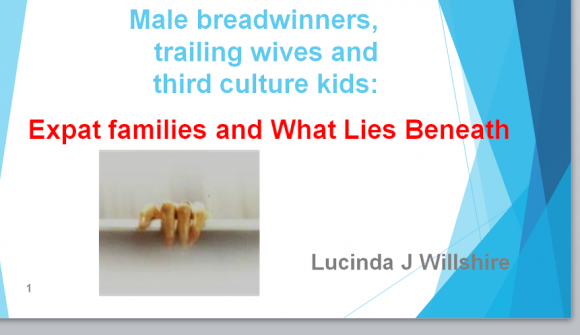 Interview with Lucinda Willshire about “Male breadwinners, trailing wives and third culture kids: Expat families and What Lies Beneath” by fellow co-author of Slurping Soup & Other Confusions, Kathryn Tonges at The Parent Within. Kathryn is a parenting educator and online parenting coach.
Interview with Lucinda Willshire about “Male breadwinners, trailing wives and third culture kids: Expat families and What Lies Beneath” by fellow co-author of Slurping Soup & Other Confusions, Kathryn Tonges at The Parent Within. Kathryn is a parenting educator and online parenting coach.
 About Lucinda: Lucinda J Willshire currently works as a family counsellor at Parentline, a service funded by the Victorian education department to provide counselling regarding parenting and family issues. She has a bachelor of education, post grad in social work and recently completed her family therapy training. As a ‘trailing wife’ for more than 25 years, she supported the ‘breadwinner’ in his International career with the U.N., raised 4 ‘thirdculture kids’ and cobbled together a portable career in social work and family counselling. She worked extensively as a counsellor in expat communities and learned a lot about issues for expat families, on the job. Lucinda coauthored a book for families with young children, titled, ‘Slurping Soup and other confusions: true stories and activities to help third culture kids during transition’, using Thomas Gordon’s Parent Effectiveness Training as a framework. She currently lives in Melbourne with her 4 third culture kids and is trying to make sense of her experience as an expat and raise awareness of systemic issues that largely remain hidden to mainstream society. In November 2015, Lucinda presented some of her work on expat family life at the Australian Association of Family Therapy conference in Melbourne, Australia. She has been invited to present in Kona, Hawaii in April, 2016 at the International family therapy congress.
About Lucinda: Lucinda J Willshire currently works as a family counsellor at Parentline, a service funded by the Victorian education department to provide counselling regarding parenting and family issues. She has a bachelor of education, post grad in social work and recently completed her family therapy training. As a ‘trailing wife’ for more than 25 years, she supported the ‘breadwinner’ in his International career with the U.N., raised 4 ‘thirdculture kids’ and cobbled together a portable career in social work and family counselling. She worked extensively as a counsellor in expat communities and learned a lot about issues for expat families, on the job. Lucinda coauthored a book for families with young children, titled, ‘Slurping Soup and other confusions: true stories and activities to help third culture kids during transition’, using Thomas Gordon’s Parent Effectiveness Training as a framework. She currently lives in Melbourne with her 4 third culture kids and is trying to make sense of her experience as an expat and raise awareness of systemic issues that largely remain hidden to mainstream society. In November 2015, Lucinda presented some of her work on expat family life at the Australian Association of Family Therapy conference in Melbourne, Australia. She has been invited to present in Kona, Hawaii in April, 2016 at the International family therapy congress.
Lucinda thank you for agreeing to share with us about your presentation. You have been invited to speak at the International Family Therapy Association (IFTA) Congress in Hawaii in April 2016. Your topic “Male breadwinners, trailing wives and third culture kids: Expat families and What Lies Beneath ” sounds so interesting. Why did you choose this title/ topic?
Hi Kathryn, I am excited to present this topic in Hawaii because I worked as a counsellor in expat communities for over 26 years and draw on my clinical work as well as my own lived experience to report on challenges that can arise in this seemingly perfect family life.
Living in Malawi, Australia, Vietnam, Indonesia, China and the U.S.A. for more than 2 decades while raising a family, you have observed the impact of expat life on families. What are the most significant benefits and challenges?The benefits are numerous and include travel adventures, cultural experiences, international friendships, house staff and international schooling. It seems like the perfect family life right! However challenges arise with making transitions. Decisions may be based on one person’s career without carefully considering the needs of all family members. Complex practical and emotional issues can arise in expat families and there is often a lack of appropriate support in emotional, legal, health and education systems to help families navigate problem situations.
What is your main message to trailing spouses? Trailing spouses have a right to maintain a solid sense of themselves not only as a supportive partner and parent, but as a person with a viable source of income and an ability to continue ongoing education and interests especially if the expat experience is anticipated to be long term.
What were the strategies that you are pleased that you used to help you cope? I coped by maintaining strong connections with friends and family in my home country. I sought professional counselling when we needed it. I kept up exercise and yoga, personal interests and I pursued friendships with other expats. I also cobbled together a career ‘in a suitcase’ so to speak!
What would you have done differently? I would have liked access to family therapy at times during major transitions. I might have preferred stints in the home country between overseas postings.
What is the research showing? To be honest, there is not a lot of research into expat family life that views the family as an ’emotional unit’ rather than from the viewpoint of individual adults reflecting back. Anecdotes of marriage breakdowns, fractured families and infidelities in expat communities are common, however hard facts and statistics are hard to find.
What can parents do to best support their children to cope with the many transitions they face like friendship loss and change, cultural transitions, sense of belonging, and family adjustments? Parents can listen to their kids, acknowledge their feelings and perspectives and make decisions together that consider all needs equally and are based on outcomes that everyone agrees to.
What was the motivation for the Slurping Soup & Other Confusions book? The Slurping Soup book was written to give voice to expat children’s unique experiences though stories and activities presented in a kind of therapeutic format and by extension help families give their kids a ‘stake’ in expat family life.
Thanks Kathryn for giving me the opportunity to talk about my presentation at the upcoming international family therapy congress. I can’t wait to let you know how it all goes. Best wishes, Lucinda
Thank you so much Lucinda. I wish you all the very best. You have so much wisdom to share through your family, work, studies, and rich and diverse expatriate experiences. Kathryn


